
|
NEDERLANDS | ENGLISH
|
|
|
30 September 2007 |
 mail this article
| mail this article
|
 print
| print
|  
This article is part of the series: The coming war against Iran
[ 1 - 2 - 3 - 4 - 5 - 6 - 7 - 8 - 9 - 10 - 11 - 12 - 13 - 14 - 15 - 16 - 17 - 18 - 19 - 20 - 21 - 22 - 23 - 24 - 25 - 26 - 27 - 28 - 29 - 30 - 31 - 32 - 33 - 34 - 35 - 36 - 37 - 38 - 39 - 40 - 41 - 42 - 43 - 44 - 45 ]
En route to a military confrontation with Iran
By Daan de Wit
This article has been translated into English by Ben Kearney Neither the situation in Iraq, nor the financial crisis, nor the price of oil is capable of driving the issue of Iran into the background. The threat of a conflict with Iran remains at the top of the agenda. Only in part this drumbeat for war is being fed only by articles from Fox News such as 'U.S. Officials Begin Crafting Iran Bombing Plan' or the report being shown on later today by Fox, Iran: Ticking Bomb. Former National Security Advisor for President Carter, Zbigniew Brzezinski, said in a CNN interview with Wolf Blitzer that 'the president and particularly the vice president are trying to hype the atmosphere', whereby he also sees obvious connections to the run-up to the war with Iraq. The Russian Foreign Minister Lavrov said that the 'Numerous reports on the possible implementation of military action against Iran are causing concern'. By this he is referring in part to the statement by his French colleague Bernard Kouchner who earlier said: 'We have to prepare for the worst, and the worst is war'. Kouchner later clarified his statement: 'I'm not in favor of war with Iran, I want to prevent the war'. Iranian President Ahmadinejad said in a recent interview: 'It's wrong to think that Iran and the US are walking towards war. Who says so? Why should we go to war? There is no war in the offing.' Meanwhile Iran is showing off the new Ghadr-1 missile, which has a range of 1800 kilometers, 'sufficient to put US bases in the Middle East and Iran's arch enemy Israel within reach.' 'This constant drum beat of conflict is what strikes me which is not helpful and not useful', said Admiral William Fallon, head of USCentcom. What kind of a chance at diplomacy did Rice actually get? As opposed to the lead-up to the war with Iraq, it seems as if the people surrounding Secretary of State Rice - due to the situation in Iraq - got some time to work with that needed to be used to ripen the atmosphere for a new war, this time against Iran. In the meantime Iran is once again at the top of the agenda, and the odds of Iran not being attacked are looking awfully small. The question is just how much of a chance Rice ever had. The possibility that Rice's opportunity 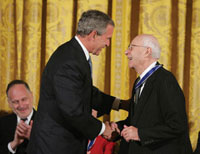 might not have been very serious can in part be construed from the comments of one of the most important neoconservatives, Norman Podhoretz. He wanted a conversation with the president and Karl 'the architect' Rove and thus got it - for 45 minutes they listened to him intently: '"I did say to [the president], that people ask: Why are you spending all this time negotiating sanctions? Time is passing. I said, my friend [Robert] Kagan wrote a column which he said you were giving 'futility its chance.' And both he and Karl Rove burst out laughing. "It struck me," Podhoretz added, "that if they really believed that there was a chance for these negotiations and sanctions to work, they would not have laughed. They would have got their backs up and said, 'No, no, it's not futile, there's a very good chance.' [...] Podhoretz said he believes that "Bush is going to hit" Iran before the end of his presidency. His assumption is based on intellectual instinct.' The authors of an analysis of the situation with Iran write: 'We should not underestimate the Bush administration's ability to convince itself that an "Iran of the regions" will emerge from a post-rubble Iran. So, do not be in the least surprised if the United States attacks Iran. Timing is an open question, but it is hard to find convincing arguments that war will be avoided, or at least ones that are convincing in Washington.' might not have been very serious can in part be construed from the comments of one of the most important neoconservatives, Norman Podhoretz. He wanted a conversation with the president and Karl 'the architect' Rove and thus got it - for 45 minutes they listened to him intently: '"I did say to [the president], that people ask: Why are you spending all this time negotiating sanctions? Time is passing. I said, my friend [Robert] Kagan wrote a column which he said you were giving 'futility its chance.' And both he and Karl Rove burst out laughing. "It struck me," Podhoretz added, "that if they really believed that there was a chance for these negotiations and sanctions to work, they would not have laughed. They would have got their backs up and said, 'No, no, it's not futile, there's a very good chance.' [...] Podhoretz said he believes that "Bush is going to hit" Iran before the end of his presidency. His assumption is based on intellectual instinct.' The authors of an analysis of the situation with Iran write: 'We should not underestimate the Bush administration's ability to convince itself that an "Iran of the regions" will emerge from a post-rubble Iran. So, do not be in the least surprised if the United States attacks Iran. Timing is an open question, but it is hard to find convincing arguments that war will be avoided, or at least ones that are convincing in Washington.' Military preparations for an attack on Iran The U.S. military apparatus is well prepared for an attack on Iran. In addition to the military plans of USStratcom (carried out by USCentcom), devised with an attack on Iran in mind, there now appears to be something called Project Checkmate. 'Checkmate's role is to develop the necessary expertise so that "if somebody says Iran, it says: 'here is what you need to think about'. Here are the objectives, here are the risks, here is what it will cost, here are the numbers of planes we will lose, here is how the war is going to end and here is what the peace will look like"'. Checkmate has already proven its usefulness in the past: 'Project Checkmate, a successor to the group that planned the 1991 Gulf War's air campaign, was quietly reestablished at the Pentagon in June. [...] It was revived under Colonel John Warden and was responsible for drawing up plans for the crushing air blitz against Saddam Hussein at the opening of the first Gulf war.' It's speculation to talk about connections, but what should be noted is that as far as war with Iran goes, airstrikes are what are usually talked about. The Raw Story writes about the study entitled Considering a war with Iran: A discussion paper on WMD in the Middle East: 'Most significantly, Plesch and Butcher [in their report] dispute conventional wisdom that any US attack on Iran would be confined to its nuclear sites. Instead, they foresee a "full-spectrum approach," designed to either instigate an overthrow of the government or reduce Iran to the status of "a weak or failed state." Although they acknowledge potential risks and impediments that might deter the Bush administration from carrying out such a massive attack, they also emphasize that the administration's National Security Strategy includes as a major goal the elimination of Iran as a regional power.' Despite the fact that it's not advisable to attach a time-frame to an incident of such magnitude, it's still interesting to take note of this report from the news agency UPI earlier this year: '[...] a well-informed source tells United Press International that according to senior U.S. intelligence officials, President Bush has definitely decided not to strike any of Iran's alleged nuclear weapons production facilities this year. The sources say the officials stressed the words "this year," meaning in 2007. That, however, does not rule out the possibility of military intervention in 2008, right until January 2009, when Bush's term in the White House comes to an end. This information seems to back up a report published in the July 16 issue of the London Guardian that claims President Bush gave in to Vice President Dick Cheney, accepting to carry out military action against Iran before he leaves office.' War with Iran in the interests of extreme factions, both in U.S. and Iran Earlier in this series the remarkable similarities between the two leaders of the U.S. and Iran were covered under the heading The twins Bush/Ahmadinejad on the basis of an insightful article by neocon-watcher Jim Lobe, entitled Ahmadinejad and Bush: Separated at Birth? American foreign policy expert Steve Clemons expands on this idea in his analysis of the situation with Iran: '[...] I do worry about the 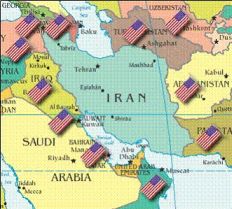 Cheney gang and the [Iran Revolutionary Guard Corps]/Ahmadinejad crowd in Iran trying to precipitate a spark that produces a very fast escalation that circumvents most of Bush's national security decisionmaking structure -- and that kind of war is something we should worry about. That's what I think could happen. [...] It would most likely be triggered by one or both of the two people who would see their political fortunes rise through a new conflict -- Cheney and Iranian President Mahmoud Ahmadinejad."' Both men draw their power through a discordant relationship with 'the other'. That's why it's not so strange that Dick Cheney sabotaged the attempt by Iran in May of 2003 at peace talks. And: 'For his part, Ahmadinejad believes Iran's potential to become a dominant player in the Middle East and to see the flourishing of its Shi'ite Islamic revolution can only be achieved if Washington remains the bogeyman "Great Satan"', writes The Vancouver Sun. Add to this information that which can be found under the heading Fundamentalist leadership in both U.S. and Iran in an earlier part of this series by DeepJournal on Iran and you end up with a disastrous cocktail in which two parties opposed to each other see a benefit in mutual conflict: 'President Ahmadinejad echoes this vision of the so-called 'End Times' held by the millions of Christians who support Bush; just like them, his view of the future is none too gloomy because he also foresees a final battle and above all redemption for mankind[...]'. Cheney gang and the [Iran Revolutionary Guard Corps]/Ahmadinejad crowd in Iran trying to precipitate a spark that produces a very fast escalation that circumvents most of Bush's national security decisionmaking structure -- and that kind of war is something we should worry about. That's what I think could happen. [...] It would most likely be triggered by one or both of the two people who would see their political fortunes rise through a new conflict -- Cheney and Iranian President Mahmoud Ahmadinejad."' Both men draw their power through a discordant relationship with 'the other'. That's why it's not so strange that Dick Cheney sabotaged the attempt by Iran in May of 2003 at peace talks. And: 'For his part, Ahmadinejad believes Iran's potential to become a dominant player in the Middle East and to see the flourishing of its Shi'ite Islamic revolution can only be achieved if Washington remains the bogeyman "Great Satan"', writes The Vancouver Sun. Add to this information that which can be found under the heading Fundamentalist leadership in both U.S. and Iran in an earlier part of this series by DeepJournal on Iran and you end up with a disastrous cocktail in which two parties opposed to each other see a benefit in mutual conflict: 'President Ahmadinejad echoes this vision of the so-called 'End Times' held by the millions of Christians who support Bush; just like them, his view of the future is none too gloomy because he also foresees a final battle and above all redemption for mankind[...]'.The notion that the Iranian elite are not looking forward to war with much dread per se would also seem to be the view of William Pfaff, author of eight books on American foreign policy and a columnist for the International Herald Tribune. Under the headline Why Iran's Revolutionary Guard Wants War with the U.S., Pfaff writes: 'Sources inside Iran [...] have described to this writer why leading figures in the Revolutionary Guard believe that an attack on their country by 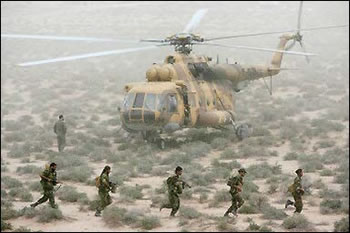 America or Israel [...] would actually produce in political but also military terms a great victory for Iran and the Islamic cause, as well as serving the Revolutionary Guard's own organizational and political interests.' According to Pfaff, the Revolutionary Guard actually sees 'Bush administration hawks, Washington's neo-conservatives, and Israel's lobbyists for an attack on Iran, as objectively their allies in promoting a defeat for the United States and decisive blow to the international standing and strategy of the United States'. Pfaff goes on to write: 'They believe they can apply to U.S. Naval forces measures of asymmetric warfare, using advanced technology, just as Lebanon's Hezbollah did last year in resisting Israel's ground intervention in Lebanon and destroying Israeli armor. Similar methods, applied by the insurgents in Iraq, have taken a severe toll in American vehicles, armor and troops.' Joseph Cirincione of the Center for American Progress adds to this: 'It's going to be very hard to defend U.S. ships against small ships and volleys of missiles in the confines of the Persian Gulf'. Pfaff: '[...] If the U.S. were to break the world's six-decade nuclear truce since Hiroshima and Nagasaki, and use nuclear weapons against Iranian defenses, as Vice President Dick Cheney reportedly favors, these Iranian believe America would be left an international pariah.' America or Israel [...] would actually produce in political but also military terms a great victory for Iran and the Islamic cause, as well as serving the Revolutionary Guard's own organizational and political interests.' According to Pfaff, the Revolutionary Guard actually sees 'Bush administration hawks, Washington's neo-conservatives, and Israel's lobbyists for an attack on Iran, as objectively their allies in promoting a defeat for the United States and decisive blow to the international standing and strategy of the United States'. Pfaff goes on to write: 'They believe they can apply to U.S. Naval forces measures of asymmetric warfare, using advanced technology, just as Lebanon's Hezbollah did last year in resisting Israel's ground intervention in Lebanon and destroying Israeli armor. Similar methods, applied by the insurgents in Iraq, have taken a severe toll in American vehicles, armor and troops.' Joseph Cirincione of the Center for American Progress adds to this: 'It's going to be very hard to defend U.S. ships against small ships and volleys of missiles in the confines of the Persian Gulf'. Pfaff: '[...] If the U.S. were to break the world's six-decade nuclear truce since Hiroshima and Nagasaki, and use nuclear weapons against Iranian defenses, as Vice President Dick Cheney reportedly favors, these Iranian believe America would be left an international pariah.'Oil as argument to attack Iraq and Iran 'I cannot understand why we don't name what is evident and indeed a wholly defensible pre-emptive position' says Alan Greenspan, former chairman of the private bank known as the Federal Reserve, 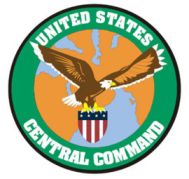 speaking to The Guardian. He describes in his new book the public secret that the motive for the war against Iraq was rooted in oil: 'I'm saddened that it is politically inconvenient to acknowledge what everyone knows: The Iraq war is largely about oil'. Greenspan describes what I wrote starting in November of 2001 in my seven part series on oil - that it was one of the major reasons to attack Iraq. Without much ado, USCentcom - the American command center that carries out attack plans - writes: 'The national interests outlined in the National Security Strategy and the objectives articulated in our National Military Strategy form the bases for the Central Command's objectives and supporting strategy. Primary among U.S. interests in the USCENTCOM AOR [Area of Responsibility] is uninterrupted secure access to Arabian Gulf oil.' This by the way is a strategy developed by National Security Advisor Zbigniew Brzezinski for the Democratic President Jimmy Carter and which was named the Carter Doctrine. speaking to The Guardian. He describes in his new book the public secret that the motive for the war against Iraq was rooted in oil: 'I'm saddened that it is politically inconvenient to acknowledge what everyone knows: The Iraq war is largely about oil'. Greenspan describes what I wrote starting in November of 2001 in my seven part series on oil - that it was one of the major reasons to attack Iraq. Without much ado, USCentcom - the American command center that carries out attack plans - writes: 'The national interests outlined in the National Security Strategy and the objectives articulated in our National Military Strategy form the bases for the Central Command's objectives and supporting strategy. Primary among U.S. interests in the USCENTCOM AOR [Area of Responsibility] is uninterrupted secure access to Arabian Gulf oil.' This by the way is a strategy developed by National Security Advisor Zbigniew Brzezinski for the Democratic President Jimmy Carter and which was named the Carter Doctrine.The original designation [video] for the attack on Iraq in 2003 was Operation Iraqi Liberation (OIL), before being renamed Operation Iraqi Freedom (OIF). Henry Kissinger, a man of equal stature to Greenspan, actually writes the same thing as the former Fed chair in relation to oil, but this time on Iran: '[...] an Iran that practices subversion and seeks hegemony in the region - which appears to be the current trend - must be faced with red lines it will not be permitted to cross. The industrial nations cannot accept radical forces dominating a region on which their economies depend, and the acquisition of nuclear weapons by Iran is incompatible with international security.' Speaking about those same weapons of mass destruction, but this time in reference to the war against Iraq, Greenspan says: 'I thought the issue of weapons of mass destruction as the excuse was utterly beside the point'. It remains to be seen to what extent history will repeat itself now that it's not oil-rich Iraq - but its oil-rich neighbor Iran - that is being accused of possessing or producing weapons of mass destruction by the same people that invaded Iraq on the basis of arguments and accusations which, as I described afterwards as well as during that period, appeared to be false. Investigative reporter John Pilger writes: 'The main reason was oil. [Former US treasury secretary Paul] O'Neill was shown a Pentagon document entitled Foreign Suitors for Iraqi Oilfield Contracts, which outlined the carve-up of Iraq's oilfields among the major Anglo-American companies. Under a law written by American and British officials, the Iraqi puppet regime is about to hand over the extraction of the largest concentration of oil on earth to Anglo-American companies.' Meanwhile criticism is being heard (1, 2, 3) of the plans on how Iraqi oil will have to leave Iraq. Pilger: 'Nothing like this piracy has happened before in the modern Middle East. Across the Shatt al-Arab waterway the other prize: Iran's vast oilfields. Just as non-existent weapons of mass destruction or facile concerns for democracy had nothing to do with the invasion of Iraq, so non-existent nuclear weapons have nothing to do with an American onslaught on Iran.' War or no war with Iran? The interpretation of the facts is a task for the reader. Two options seem to be available. Option one: the constant threat of an attack on Iran is to keep up the pressure so as to give the 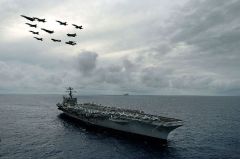 diplomatic route a chance to succeed, somthing also contended by an anonymous diplomat in a recent article in Newsweek: 'The idea was to periodically float the possibility of war in public comments in order to keep Iran off balance. In truth, the official said, no war preparations are underway.' Option two: the constant threat is the tough reality that gets to be realized once the diplomatic talkshows are held and it becomes apparent that the diplomatic route, as was to be expected and probably even intended, has failed. In the first scenario, the big stick of military might is wielded as a coercive means to help diplomacy succeed, while in the other scenario diplomacy is a smokescreen as well as the initial, non-physical aspect of the attack, just as it was with the build-up to war with Iraq. Watch the video I made on the parallels between the build-up to the war with Iraq and the possible coming war with Iran. diplomatic route a chance to succeed, somthing also contended by an anonymous diplomat in a recent article in Newsweek: 'The idea was to periodically float the possibility of war in public comments in order to keep Iran off balance. In truth, the official said, no war preparations are underway.' Option two: the constant threat is the tough reality that gets to be realized once the diplomatic talkshows are held and it becomes apparent that the diplomatic route, as was to be expected and probably even intended, has failed. In the first scenario, the big stick of military might is wielded as a coercive means to help diplomacy succeed, while in the other scenario diplomacy is a smokescreen as well as the initial, non-physical aspect of the attack, just as it was with the build-up to war with Iraq. Watch the video I made on the parallels between the build-up to the war with Iraq and the possible coming war with Iran. Willem Grooters en Hans Sanou contributed research for this article.
____________________________________________________________________________
DeepJournal Sign up for the free mailing list. |